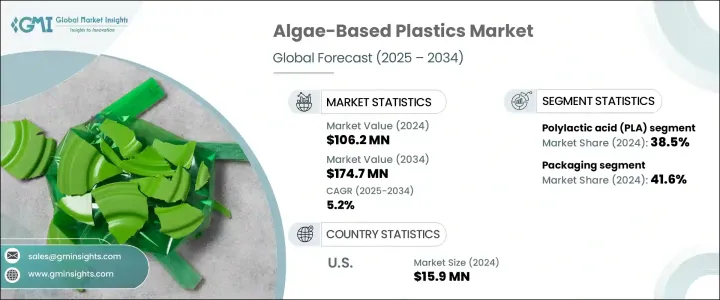
세계의 조류 기반 플라스틱 시장은 2024년 1억 620만 달러였으며, 일회용 플라스틱에 대한 환경 규제의 강화, 지속 가능한 대체품을 요구하는 환경 의식이 높은 소비자 증가, 조류 기반 바이오폴리머 개발에서의 기술 혁신 등을 배경으로 CAGR 5.2%로 성장해 2034년까지 1억 7,470만 달러에 달할 것으로 예상됩니다.
조류 기반 플라스틱은 산업계가 화석 연료 유래의 제품을 대체하는 재생 가능한 생분해성 재료를 요구하는 가운데, 강한 기세를 늘리고 있습니다. 정부나 규제 기관도 지속 가능한 관행을 지지하는 정책 조치를 통해 채용을 장려하고 있습니다.

기업이나 제조업체가 환경발자국 삭감을 강요받는 가운데, 조류를 원료로 하는 바이오플라스틱은 넷 제로의 대처나 ESG 목표에 합치하는 신뢰할 수 있는 대체품으로서 대두해 왔습니다. 비재생에너지에 대한 의존을 줄이는 것과 동시에, 탄소의 고정화에도 공헌한다고 하는 2개의 임팩트를 가지는 조류 기반의 소재는 환경 전략적인 솔루션으로서 자리 매김되고 있습니다.
| 시장 범위 | |
|---|---|
| 시작 연도 | 2024년 |
| 예측 연도 | 2025-2034년 |
| 시작 금액 | 1억620만 달러 |
| 예측 금액 | 1억 7,470만 달러 |
| CAGR | 5.2% |
폴리유산(PLA) 부문은 2024년에 38.5%의 점유율을 차지했습니다. 현재 플라스틱 생산 인프라와의 호환성도 특히 산업계가 석유 유래 재료에 대한 의존을 줄이는 것을 목표로 하고 있기 때문에 그 보급을 가속시키고 있습니다.
환경 친화적인 포장 옵션에 대한 수요가 증가하고 일부 국가에서 플라스틱 금지 조치가 수행됨에 따라 2024년 포장 분야의 점유율은 41.6%로 늘어났습니다. 식품, 화장품, 로지스틱스등 다양한 분야의 기업이, 그린 크리덴셜을 강화해, 환경에 대한 영향을 경감하기 위해서 조류 기반 플라스틱을 도입하고 있습니다.
미국의 조류 기반 플라스틱 시장은 2024년에 15%의 점유율을 차지했으며, 기업 책임에 대한 대처의 확대, ESG 주도형 투자 증가, 지속 가능한 대체품에 대한 소비자의 강한 수요가 그 요인이 되고 있습니다. 소매, 식품, 포장 업계의 기업은 환경 전략의 일환으로 생분해성 플라스틱에 주목하고 있습니다.
세계의 조류 기반 플라스틱 시장을 형성하는 주요 기업은 Sway Innovation, Notpla, Flex-sea, Eranova, BZEOS 등이 있습니다. 이들 기업은 전략적 연구개발 투자, 포장 제조업체와의 제휴, 재료 성능 향상을 목적으로 한 파일럿 프로그램을 통해 시장에서의 존재감을 높여주고 있습니다.
The Global Algae-Based Plastics Market was valued at USD 106.2 million in 2024 and is estimated to grow at a CAGR of 5.2% to reach USD 174.7 million by 2034, driven by increased environmental regulations on single-use plastics, the rise of eco-conscious consumers demanding sustainable alternatives, and technological innovation in algae-derived biopolymer development. Algae-based plastics are gaining strong momentum as industries seek renewable, biodegradable materials to replace fossil fuel-based products. Governments and regulatory bodies are also encouraging adoption through policy measures that favor sustainable practices. With increasing focus on climate change and waste reduction, these plastics are being seen as a key component in the shift toward a circular economy.

As corporations and manufacturers face mounting pressure to reduce their environmental footprint, algae-based bioplastics are emerging as a credible alternative that aligns with net-zero commitments and ESG goals. In addition to being biodegradable, algae-derived plastics offer benefits like carbon capture during algae cultivation and lower greenhouse gas emissions throughout the production cycle. This dual impact-reducing reliance on non-renewables while also helping sequester carbon-positions algae-based materials as an environmentally strategic solution. The market is also benefiting from investments in research and infrastructure that aim to improve material strength, flexibility, and commercial viability for broader applications in packaging, textiles, automotive, and consumer products.
| Market Scope | |
|---|---|
| Start Year | 2024 |
| Forecast Year | 2025-2034 |
| Start Value | $106.2 Million |
| Forecast Value | $174.7 Million |
| CAGR | 5.2% |
The polylactic acid (PLA) segment accounted for a 38.5% share in 2024. PLA remains a dominant material due to its excellent clarity, rigidity, and ease of processing, making it highly suitable for consumer goods and packaging applications. Its compatibility with current plastic production infrastructure is also accelerating its uptake, especially as industries aim to reduce reliance on petroleum-based materials. With bio-manufacturing research advancing rapidly, PLA's scalability and commercial viability continue to improve.
The packaging segment held a 41.6% share in 2024, driven by the rising demand for environmentally friendly packaging options and the implementation of plastic bans across several countries. These materials are especially attractive to brands looking to align with sustainability standards while meeting consumer expectations for ethical and biodegradable packaging. Companies across sectors, including food, cosmetics, and logistics, are incorporating algae-based plastics to enhance their green credentials and reduce environmental impact.
United States Algae-Based Plastics Market held a 15% share in 2024, fueled by growing corporate responsibility efforts, a rise in ESG-driven investments, and strong consumer demand for sustainable alternatives. Businesses in the retail, food, and packaging industries are turning to biodegradable plastics as part of their environmental strategies. Start-ups and established companies are increasingly collaborating to bring algae-based materials to commercial scale and meet surging demand in North America.
Key players shaping the Global Algae-Based Plastics Market include Sway Innovation, Notpla, Flex-sea, Eranova, and BZEOS. These companies are enhancing their market presence through strategic R&D investments, partnerships with packaging manufacturers, and pilot programs aimed at improving material performance. They are also expanding their product lines, focusing on scalability, cost reduction, and regulatory compliance to attract both investors and global clientele.